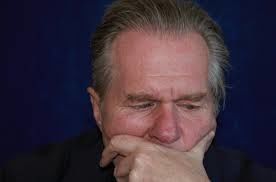Pessimism
Are You a Cynical Idealist?
Beware: Without a cautionary cynicism, your idealism can harm you.
Updated January 9, 2024
Source: Dustbin Baby/Wikipedia Commons“Scratch any cynic and you will find a disappointed idealist.” George Carlin

It’s all too easy to miss the intimate connection between cynicism and idealism. And by itself the oxymoron “cynical idealist” demands clarification, since it propels us in two opposing directions at once. Still, an unqualified idealism can be seen as naturally “trending” toward cynicism as, inevitably, the whole enterprise of living compels us to add increasingly more qualifications to that idealism.
Let’s start by looking at root definitions of both these terms, particularly as they relate to values and ethics.
As defined by Dictionary.com, idealism is all about “cherishing or pursuing high or noble principles, purposes, [and] goals.” So unless we think that “high and noble” implies what already is—rather than what, ideally, should be—it’s clear that these “principles, purposes, and goals” are mostly aspirational. They’re lofty beyond what might be seen as normal or customary. The basic concept of idealism is essentially one of transcendence: either pursuing—or desiring, wishing, or even longing for—what doesn’t yet exist (if, in fact, it ever can).
Cynicism, probably best viewed as defeated idealism (note Carlin’s quote), suggests a disenchantment with what had earlier been believed or sought after. Here’s a representative definition of a cynic:
A faultfinding captious critic; especially one who believes that human conduct is motivated wholly by self-interest. (Merriam-Webster.com)
Contrasting with this almost misanthropic perspective is the substantial scientific research discussed in Born to Be Good, by Univ. of California, Berkeley Professor Dacher Keltner, which clearly favors the position that human compassion and virtue are innate in us. It posits that we’re not naturally selfish or aggressive but cooperative and well-meaning. His optimistic (idealistic?) conclusion stems from his studies on the biological and evolutionary origins of such phenomena as beauty, gratitude, awe, power, social class and inequality, and compassion (e.g., see Wikipedia’s description of Keltner’s work).
As hopeful—and inspirational—as is Keltner’s well-documented perspective, it doesn’t explore the problem of human ego (also inborn in us), which militates against the possibility of universal benevolence. Contrary to the altruistic communal ideals harmoniously connecting us, ego is about our being separate from others and needing to prove that we’re better—or more “special”—than they are, which in turn drives us to compete (versus cooperate) with them. And just about all the world’s age-old problems can be attributed to this egoistic orientation, best seen as self-absorbed and selfishly based and, if not downright shameful, certainly not very admirable either. For it implies a life stance almost guaranteed to eventuate in endless conflict and corruption.
Answering the question of whether the world has ever been at peace, journalist, activist, and Princeton University Professor Chris Hedges, notes that “of the past 3,400 years, humans have been entirely at peace for 268 of them, or just 8 percent of recorded history.” . . . Enough said?
So how, exactly, do so many people move from a pure, untainted idealism—which, purportedly, is intrinsic to our nature—to a far more nuanced (and negative) “cynical idealism”? Ironically, such a conceptual degradation is a natural outgrowth of this far more utopian, though ultimately untenable (or quixotic) stance. It’s moving from what might be designated a “romantic,” or unconditionally, idealistic, stance toward a more sophisticated and realistic one. And it results from a combination of formal and informal education, growing maturation, and an ever-evolving, level-headed assessment of experience.
We learn to be wary about what we’re told because too often it contradicts what’s right before our eyes. The rhetoric we’re exposed to frequently doesn’t jibe with the actual deeds we witness, and so we learn to distrust others’ intentions and motives. As our disappointments multiply, so does our skepticism. And not just of others but of institutions and conventions— whether they be familial, societal, religious, educational, or governmental. At its extreme, pure pragmatism or pessimism trumps our ideals completely. Take the words of Oscar Wilde, who caustically wrote: “A cynic is a man who knows the price of everything, and the value of nothing.”
But though the demeaning, disdainful negativity of pure cynicism has little to recommend it, adopting the viewpoint of the cynical idealist makes a great deal of sense. It’s a modified, necessarily self-protective stance in the face of a world that routinely doesn’t operate in accordance with any of our golden-rule principles.
Consider the disillusioned words of Noha Medhat in his “Why I Am a Cynical Idealist”
I wasn’t always cynical. I didn’t decide to adopt cynicism, it grew on me. More specifically, it grew from my idealism. . . . I wore [my prideful sense of right and wrong] like a black and white armor to fight off all the greys life consistently tried to shove down my throat. But slowly and surely, my armor started to crack. . . . The truth is, I don’t hate humanity. I hate humanity’s dishonesty. I hate humanity’s hypocrisy. I hate humanity’s reprehensible corruption of the essence of humanity.
Notice how these thoughts telescope the author’s gradual transition from idealism to cynicism—or at least to an increasingly qualified, and, well, rather embittered—idealism. The “white” purity of his idealism becomes increasingly shaded as the challenges of living on planet Earth demonstrate its untenability.
In some ways, Ernest Hemingway’s soured, down-to-earth sentiments echo those of Medhat’s. For they, too, suggest how over time not only do our venerable principles get debased but can end up damaging the virtuous individuals who (idealistically) endeavor to maintain them:
The best people possess a feeling for beauty, the courage to take risks, the discipline to tell the truth, the capacity for sacrifice. Ironically, their virtues make them vulnerable; they are often wounded, sometimes destroyed. (from The Letters of Ernest Hemingway)

If we want to examine all the areas in which one’s idealism can end up feeling hopelessly futile, consider all the scenarios you’ve experienced or were informed about that cast doubt on humanity’s righteousness—situations or events that betray elemental flaws in our nature. From childhood on, how many times might you have witnessed such common human failings as they relate to:
- racism, sexism, ageism, and innumerable forms of prejudice and bigotry;
- narrow-mindedness, dogmatism, and fanaticism;
- selfishness, possessiveness, and avariciousness;
- manipulation, connivance, and collusion;
- bad-temperedness, cantankerousness, and spitefulness;
- domination, bullying, and shaming;
- venality and corruption;
- exploitation, treachery, deception, gaslighting—and the almost infinite variations of dishonesty and prevarication;
- inequality and injustice;
- the abuse of power, position, and privilege;
- timidity and cowardice;
- sanctimoniousness and hypocrisy;
- deficiencies in empathy and, at its extreme, acts of evil and all sorts of repulsive, abhorrent, or lawless behaviors;
- . . . and while we’re at it, any other human failings that (regrettably) you might wish to add—including such wrong-headed idealism as Nazism or White Supremacy.
Additionally, we must admit that these unenviable qualities don’t simply exist outside ourselves. Despite our idealism, we, too, remain vulnerable to exhibiting these ignoble qualities. And in our compelling need to view ourselves positively (and that’s human ego again), we tend to overlook or minimize our personal shortcomings—or worse, project them onto others. If over time we’re to ethically evolve, we must become more aware of, and seek to change, those foibles we may have been all too quick to attribute to others.
So what’s to be done? Do we simply forsake the ideals that so often the world appears stubbornly to dishonor? For such a forfeiture would simply be to exchange our idealism for a rather mean-spirited cynicism. Plus, completely inverting our belief system would be as simplistic, as absolutist, as was our former idealism. We’d merely be switching from white to black, even though the world we inhabit points to various shades of gray—where good samaritans co-exist with rip-off artists.
Still, this grayish world of ours suggests a feasible middle ground. It’s one that permits us to maintain our noble behavioral principles, yet without expecting them to prevail. And this is what I call “fighting the good fight,” with its implication that winning may not be the probable outcome, but that just giving up is a far worse alternative. (As in Edmund Burke’s “The only thing necessary for the triumph of evil is for good men to do nothing.”)
In the end, when we’ve “looked at clouds from both sides now,” what else could possibly be most adaptive? Perhaps in her famous song “Both Sides, Now,” Joni Mitchell got it right when she soberly concluded that in looking at life from all angles, “something’s lost, but something’s gained in living every day.” When we grow older and, inevitably, a certain disenchantment sets in, obviously a more prudent perspective is called for. But that doesn’t mean we have to repudiate our ideas just because we recognize that clouds don’t always suggest “ice cream castles in the air” but also “block the sun” and prepare to “rain and snow on everyone.”
Similar to using measured honesty to avoid hurting someone’s feelings, we need to moderate any cynicism that’s emerged from the scrupulous examination of our experience. Throughout history, we humans have shown ourselves capable of acting caringly and compassionately toward others. In addition, we’ve been able to accomplish great things in science, culture, and the arts. And consider our Constitution, which reflects some of our most cherished democratic ideals (regardless of how reality demonstrates they’re constantly under threat). Surely, and independent of how much we’re actually able to live up to the principles we espouse, the position of unfettered cynicism is no more warranted than an unadulterated, unworkable idealism.
If from the totality of our experience we’ve learned what we’ve needed to, a certain degree of caution or cynicism isn’t only justified, it’s mandatory. Without such skepticism, how are we to protect ourselves from those who display many of the negative characteristics bulleted above? It’s just prudent not to believe everything we hear, or to uncritically go along with whatever venture someone might propose to us. Expressions like “caveat emptor,” or “let the buyer beware,” remain popular for good reason.
To conclude, the attitude of cynical idealism, as doubtful or pessimistic as it may sound, might be the most positive—and yes, meaningful—life stance for you. Here you’re not discarding your idealism, you’re simply revising it to reflect realities you can’t, with impunity, ignore. If you do, your indiscriminately optimistic stance would be too costly, carry too much risk. To put it a little differently, the “existential compromise” embedded in adopting a cynical idealism is geared to help you best survive in a world where many forces, hostile or merely indifferent, may lie in wait to defeat you.
It's similar to the tactic of driving defensively. You need to stay aware of the fact that the world embodies various shades of gray. It's hardly constructed to promote your personal safety or security, so the optimal way for you to cope is to "look out" for yourself.
. . . And this adaptive stance of cynical idealism is "ideally" suited for such a task.
NOTE: As regards the gulf between the aspirational and the realistic, readers might want to look at my 4-part article on the golden rule (see here, here, here, and here).




